Authors
David G. Brown

David G. Brown is a visiting scholar in the China Studies Program at the Johns Hopkins School of Advanced International Studies (SAIS). From 1999 to 2016, he served first as associate director of Asian Studies and then as an adjunct professor in the China Studies program at SAIS. His 30-year diplomatic career focused on Asia and included assignments in Tokyo, Beijing, Taipei, Hong Kong, and Saigon as well as tours in Vienna and Oslo. After leaving government in 1996, Brown served as senior associate at the Asia Pacific Policy Center, a nonprofit institution in Washington DC. During 1996-2000, Brown served concurrently as the chair of the East Asian Area Studies course at the State Department’s Foreign Service Institute. He joined SAIS in 1999. He has a degree in East Asian Studies from Princeton University.
Articles by David G. Brown
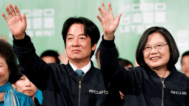
China - Taiwan
January — April 2020Coronavirus Embitters Cross-Strait Relations
After President Tsai Ing-wen won re-election and her Democratic Progressive Party retained its legislative majority, COVID-19 dominated the news, further embittered cross-strait relations, and provoked a sharp confrontation over Taiwan’s involvement in the World Health Organization. Beijing conducted more military operations near the island in response to concern that Taiwan is pushing independence, and the Trump and Tsai administrations strengthened ties. The opposition Kuomintang chose a younger, reform-minded leader following the latest in a series of defeats.
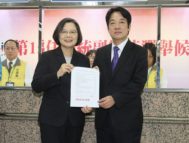
China - Taiwan
September — December 2019Election Portends Continued Tension
President Tsai Ing-wen triumphed over her populist Kuomintang (KMT) opponent Han Kuo-yu in Taiwan’s January 11, 2020 presidential election, garnering 57.1% of the vote to Han’s 38.6%. Tsai’s Democratic Progressive Party (DPP) also retained its majority in the Legislative Yuan (LY), albeit with the loss of some seats to the KMT and third parties. While there has been considerable attention to Beijing’s influence operations, the election illustrated Beijing’s limited ability to manipulate Taiwan elections. The outcome portends continued deadlock and tension in cross-strait relations in the coming months. Meanwhile, Taipei and Washington have strengthened ties by launching a series of bilateral and multilateral cooperative projects, intended in part to counter both Beijing’s influence operations and its continuing diplomatic, economic, and military pressures on Taiwan.
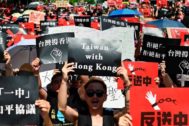
China - Taiwan
May — August 2019Hong Kong Impacts Taiwan Elections
The coming elections in Taiwan have shaped cross-strait relations. To a surprising degree, Hong Kong demonstrations have influenced the early campaign, helping President Tsai Ing-wen win her party’s nomination and requiring opposition candidates to reject Beijing’s “one country, two systems” more firmly than they would have otherwise. In the midst of US-China tensions, Washington has approved two major arms sales to Taiwan and taken other steps to improve US-Taiwan relations. Beijing opposes Tsai and has taken steps publicly and behind the scenes to boost the KMT’s populist candidate, Kaohsiung Mayor Han Kuo-yu. Beijing’s hardline response to Hong Kong demonstrations will likely continue to benefit Tsai as the election approaches in January.
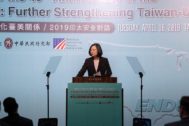
China - Taiwan
January — April 2019Troubling Tensions
The year began with General Secretary Xi Jinping and President Tsai Ing-wen making major statements that underline the fundamental gap between the Chinese Communist Party (CCP) and Taiwan. In the face of Beijing’s continuing pressure on Taiwan, Washington and Taipei took steps to strengthen relations and celebrate the 40th anniversary of the Taiwan Relations Act (TRA). In Congress, members proposed new measures, some of which challenge the established framework for US relations with Taiwan and China. Beijing repeatedly protested these efforts and in April sent two PLA fighters deliberately across the midline of the Taiwan Strait for the first time in 20 years in an ill-defined warning. In Taiwan, maneuvering for the 2020 elections has begun creating a confusing situation with unclear implications for cross-strait and US-Taiwan relations.
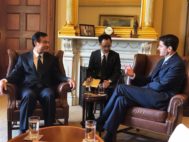
China - Taiwan
September — December 2018DPP Suffers Defeat
The Democratic Progressive Party (DPP) suffered a stunning defeat in Taiwan’s November local elections. Although local issues and personalities were the focus of the campaign, cross-strait economic issues did play a role. The Kuomintang’s (KMT) revival, which improves its prospects in the 2020 legislative and presidential elections, was welcomed in Beijing. While Taipei continues to be concerned about seriously strained US-China relations, Taipei and Washington continue to strengthen their ties.

China - Taiwan
May — August 2018Tsai Firm in the Face of Pressure
Beijing has ratcheted up pressure on President Tsai Ing-wen, while also promoting Taiwan’s integration with China. In response, Tsai has strengthened ties with major powers and modestly increased support for defense. Despite Chinese and domestic pressures, Tsai has adhered to her cross-strait policy. Taiwan’s November local elections could have implications for the 2020 presidential election and future cross-strait relations. Beijing remains concerned about US policy toward Taiwan. The Trump administration has taken steps to support Taiwan, but the president appears at times to see Taiwan as an element useful in US-China negotiations. The American Institute in Taiwan (AIT) dedicated its new office building in Taiwan, but no Cabinet official participated.
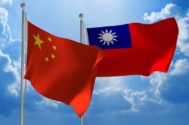
China - Taiwan
January — April 2018Taiwan Caught Between US and China
General Secretary Xi Jinping maneuvered the Chinese Communist Party (CCP) into removing term limits so that he can lead China indefinitely. Beijing has increased pressure on Taiwan, but also rolled out new measures aimed at increasing Taiwan’s economic and social integration with the mainland. On Taiwan, pro-independence elements continue pressing President Tsai Ing-wen. The passage of the Taiwan Travel Act (TTA), which was generally welcomed in Taipei, created a new US-China controversy. The appointment of John Bolton as national security advisor and the Trump administration’s tariff and technology actions against China have renewed fears in Taipei that Taiwan will become a bargaining chip or suffer collateral damage in a US-China confrontation.

China - Taiwan
September — December 2017Continuity After 19th Party Congress
Defying some predictions, the outcome of the 19th National Congress of the Chinese Communist Party indicates there will be no significant change in Beijing’s policy toward Taiwan. Beijing will continue to demand that President Tsai Ing-wen accept the 1992 consensus and pressure on her administration will be sustained. In Taiwan, Tsai has supported domestic actions that Beijing fears are weakening cross-strait ties and her pro-independence supporters continue to press for steps that risk increasing tensions. Tsai has also urged Beijing to join in finding a new model for their relations. Beijing’s pressure on Taiwan is stimulating calls in Washington for policies that are more supportive of Taiwan. These developments in Taiwan and Washington have in turn triggered warnings from Beijing.

China - Taiwan
May — August 2017China Increases Pressure, Tsai Holds the Line
In the run-up to the 19th Party Congress, Beijing has pursued an inflexible policy toward Taiwan, consistently blocking its international participation, establishing diplomatic relations with Panama, and conducting military exercises around Taiwan. Despite such pressures, President Tsai, whose priorities are domestic economic and social reform, has not changed her policy that neither accepts nor explicitly challenges Beijing’s one-China principle, and she has urged Beijing to join in seeking a new formula. With the US Congress expressing increased support for Taiwan, the Trump administration approved a new arms sales package and took other steps to improve ties with Taiwan. Beijing has warned Washington about closer ties with Taipei, raising the prospect that Taiwan will again become a divisive issue in US-China relations. In the absence of dialogue, unstable and risky cross-strait relations will continue in the months ahead.
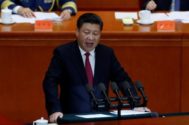
China - Taiwan
January — April 2017Adrift Without Dialogue
In February, President Trump told President Xi Jinping that the US would honor its one-China policy. This eased concern that the new administration would radically change US policy toward Taiwan, but it remains unclear how the Trump administration will deal with specific Taiwan issues. Relations between Beijing and Taipei have continued to be in an unstable but calm state in the early months of 2017. The formal channels of dialogue remain closed and no significant effort has been made to reopen them. In the meantime, practical issues have been dealt with, sometimes constructively but often in ways that exacerbate the lack of trust. This unstable and risky situation will likely continue in the months ahead.